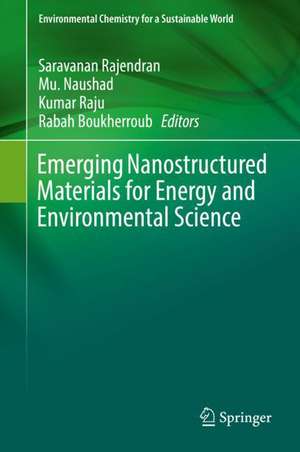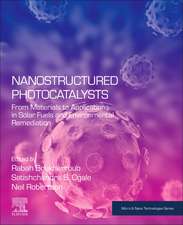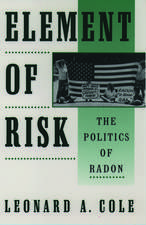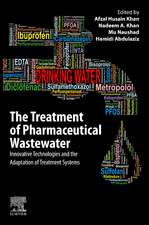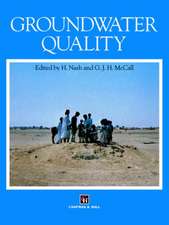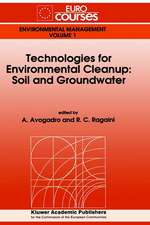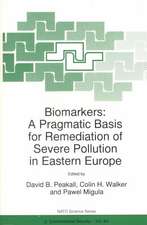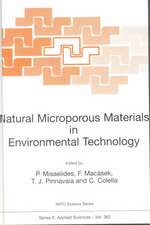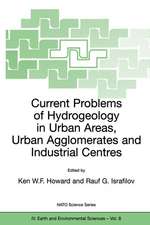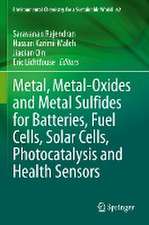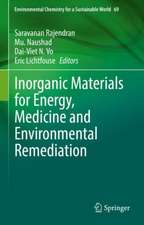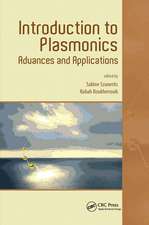Emerging Nanostructured Materials for Energy and Environmental Science: Environmental Chemistry for a Sustainable World, cartea 23
Editat de Saravanan Rajendran, Mu. Naushad, Kumar Raju, Rabah Boukherrouben Limba Engleză Hardback – 21 feb 2019
Din seria Environmental Chemistry for a Sustainable World
- 18%
 Preț: 1118.45 lei
Preț: 1118.45 lei - 15%
 Preț: 645.79 lei
Preț: 645.79 lei - 15%
 Preț: 653.14 lei
Preț: 653.14 lei - 15%
 Preț: 648.24 lei
Preț: 648.24 lei - 15%
 Preț: 643.34 lei
Preț: 643.34 lei - 15%
 Preț: 651.51 lei
Preț: 651.51 lei - 15%
 Preț: 646.62 lei
Preț: 646.62 lei - 18%
 Preț: 956.81 lei
Preț: 956.81 lei - 18%
 Preț: 959.98 lei
Preț: 959.98 lei - 15%
 Preț: 646.62 lei
Preț: 646.62 lei - 18%
 Preț: 1389.30 lei
Preț: 1389.30 lei - 18%
 Preț: 1229.10 lei
Preț: 1229.10 lei - 18%
 Preț: 1001.81 lei
Preț: 1001.81 lei - 18%
 Preț: 1118.62 lei
Preț: 1118.62 lei - 18%
 Preț: 899.21 lei
Preț: 899.21 lei - 18%
 Preț: 1120.18 lei
Preț: 1120.18 lei - 18%
 Preț: 896.08 lei
Preț: 896.08 lei - 18%
 Preț: 788.72 lei
Preț: 788.72 lei - 18%
 Preț: 1009.70 lei
Preț: 1009.70 lei - 15%
 Preț: 650.86 lei
Preț: 650.86 lei - 15%
 Preț: 646.62 lei
Preț: 646.62 lei - 18%
 Preț: 1017.62 lei
Preț: 1017.62 lei - 18%
 Preț: 1118.62 lei
Preț: 1118.62 lei - 15%
 Preț: 644.95 lei
Preț: 644.95 lei - 5%
 Preț: 915.58 lei
Preț: 915.58 lei - 24%
 Preț: 751.40 lei
Preț: 751.40 lei - 18%
 Preț: 1008.12 lei
Preț: 1008.12 lei - 18%
 Preț: 1113.89 lei
Preț: 1113.89 lei - 18%
 Preț: 950.52 lei
Preț: 950.52 lei - 18%
 Preț: 959.98 lei
Preț: 959.98 lei - 15%
 Preț: 648.42 lei
Preț: 648.42 lei - 18%
 Preț: 950.96 lei
Preț: 950.96 lei - 23%
 Preț: 852.88 lei
Preț: 852.88 lei - 18%
 Preț: 959.50 lei
Preț: 959.50 lei - 20%
 Preț: 647.13 lei
Preț: 647.13 lei - 24%
 Preț: 744.58 lei
Preț: 744.58 lei - 18%
 Preț: 1215.22 lei
Preț: 1215.22 lei - 20%
 Preț: 570.17 lei
Preț: 570.17 lei - 15%
 Preț: 647.59 lei
Preț: 647.59 lei
Preț: 824.15 lei
Preț vechi: 1084.40 lei
-24% Nou
Puncte Express: 1236
Preț estimativ în valută:
157.72€ • 164.06$ • 130.21£
157.72€ • 164.06$ • 130.21£
Carte tipărită la comandă
Livrare economică 08-14 aprilie
Preluare comenzi: 021 569.72.76
Specificații
ISBN-13: 9783030044732
ISBN-10: 3030044734
Pagini: 600
Ilustrații: XVI, 565 p. 207 illus., 158 illus. in color.
Dimensiuni: 155 x 235 mm
Greutate: 1.09 kg
Ediția:1st ed. 2019
Editura: Springer International Publishing
Colecția Springer
Seria Environmental Chemistry for a Sustainable World
Locul publicării:Cham, Switzerland
ISBN-10: 3030044734
Pagini: 600
Ilustrații: XVI, 565 p. 207 illus., 158 illus. in color.
Dimensiuni: 155 x 235 mm
Greutate: 1.09 kg
Ediția:1st ed. 2019
Editura: Springer International Publishing
Colecția Springer
Seria Environmental Chemistry for a Sustainable World
Locul publicării:Cham, Switzerland
Cuprins
1. Emerging nanomaterials in energy and environmental science – an overview.- 2. Carbon nanomaterials in renewable energy production and storage applications.- 3. Nanostructured materials for Li-ion battery applications.- 4. Nanomaterials for CO2 hydrogenation.- 5. Metal oxide additives incorporated hydrogen storage systems: Formation of in-situ catalysts and mechanistic understanding.- 6. Nanostructured metal oxides for supercapacitor applications.- 7. Third generation solar cells- concept, materials and performance: an overview.- 8. An overview of current trends in emergence of nanomaterials for sustainable microbial fuel cells.- 9. Fluoride toxicity and recent advances in water defluoridation with specific emphasis on nanotechnology.- 10. Self-assembled soft materials for energy and environmental applications.- 11. Applications of nanoparticles for self-cleaning surfaces.- 12. Metal and metal oxides-based nanomaterials for electrochemical applications.- 13. Nanobiotechnology approaches for the remediation of environmental hazards generated from industrial waste.
Textul de pe ultima copertă
This book provides the fundamental aspects of the diverse ranges of nanostructured materials (0D, 1D, 2D and 3D) for energy and environmental applications in a comprehensive manner written by specialists who are at the forefront of research in the field of energy and environmental science. Experimental studies of nanomaterials for aforementioned applications are discussed along with their design, fabrication and their applications, with a specific focus on catalysis, energy storage and conversion systems. This work also emphasizes the challenges of past developments and directions for further research. It also looks at details pertaining to the current ground – breaking of nanotechnology and future perspectives with a multidisciplinary approach to energy and environmental science and informs readers about an efficient utilization of nanomaterials to deliver solutions for the public.
Caracteristici
Provides an up-to-date review of key aspects of nanomaterials in the fascinating energy and environmental fields Describes the state-of-the-art of nanomaterials effectively playing a key role in catalysis and energy storage and conversion systems Looks at details pertaining to the current ground – breaking of nanotechnology and future perspectives with a multidisciplinary approach to energy and environmental science
